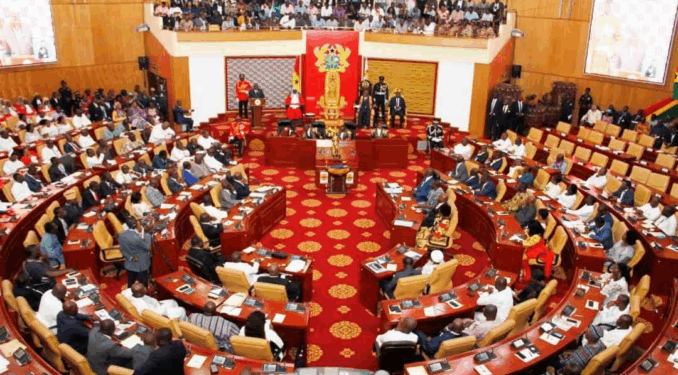Two co-sponsors of the Proper Sexuality and Family Values Bill clashed on JoyNews’ PM Express over the government’s plan to reintroduce the controversial legislation as a public bill.
Ho West MP, Emmanuel Bedzrah, and Walewale MP, Tiah Abdul-Kabiru Mahama, disagreed sharply on whether the executive should take over the process from private members.
Tiah Abdul-Kabiru Mahama said he opposed the idea of the executive bringing the bill.
According to him, Parliament must build a culture that allows private members to push bills that serve public interest, even when the government is not keen.
He said, “One of the reasons why I’m against it is that we see we must develop a culture of even where certain bills are in the interest of the public, but because the executive has some interest, they don’t want to push it on.
“Private members should be able to pass those bills. This is because the representatives of the people are the members of parliament. But if we always have this culture that every bill must come from the executive, we are not developing that.”
Responding to the constitutional argument about private members’ bills not imposing a charge on the Consolidated Fund, he argued that the interpretation of Article 108 was wrong.
He said, “If they are resting the argument on Article 108 of the Constitution, I argue that the interpretation being placed on that particular provision is wrong because the title, which is also an aid to the interpretation of the constitutional provision, states clearly that settlement of financial matters.”
He explained that the framers of the Constitution intended that the provision applied only to fiscal bills that impose taxes or confer financial benefits.
He added, “Even I participated in the recent constitutional review process, and this article is one of the areas that we are thinking of proposing amendments to, especially the title, so that it will reflect the content of this particular bill.”
Mr Tiah Mahama maintained that due process was as important as the outcome. “It is my position, and a considered well, for that matter, that processes and procedures are as good as the results,” he said.
He added, “You cannot just be interested in the results. You must be interested in the process.”
He insisted that allowing government to take over the bill would kill individual initiative and weaken democratic culture.
“If you just said, okay, let’s do it as usual, government should bring the bill in a bill that means that it even kills individual initiative,” he stated.
He warned that if Parliament always relied on the executive, important legislation might never pass. “Like the previous government, if we were relying on the executive to implement this bill, would the bill have come to pass? Definitely no,” he said.
But Emmanuel Bedzrah disagreed. He said he had no objection to the government taking over the bill.
“The question with the president was the fact that he would introduce the bill as a public bill, not a private member’s bill,” he said.
“That’s where we all stood, and we won the election. I have been waiting for the Attorney General to bring the public bill, but he is not forthcoming, so those of us who have decided to bring it back said Well the bill has already been passed in its state and form, why don’t we reintroduce it as a private members’ bill?”
He explained that the executive could later take it up.
“The government can arrest it now that, although it has been introduced as a private members’ bill, I am taking it on and I want to bring it as a public bill. There is nothing wrong with that.”
He said he would actually prefer it to become a public bill. “In fact, I will prefer that it will become a public bill, because of the argument my Senior Brother has made, the fact that you know when it is a public bill, you take away all the politics about it,” he said.
Mr Bedzrah said politics was now clouding the bill’s purpose.
“Currently, there is politics around it. From what I’ve heard from my colleagues, now is becoming a partisan roadblock, and I’m not in parliament to pass this bill as a partisan bill. I want to pass for Ghanaians.”
He said the first time the bill was introduced, it had bipartisan support.
“When we came together the first time, even though it was only Reverend Ntim Fordjour from the NPP side who joined us. He was actively involved, and I doff my hat to him.”
He said the bill should unite Ghanaians, not divide them.
“It should not be that we are avenging, or there is some form of we want to reciprocate. No, no, no. It should be that this bill is for Ghanaians, and Ghana, we are passing it for Ghanaians. And so it should not be partisan at all,” he said.
He concluded, “If government takes it, arrests it and then brings it back as a public bill, I’ll be the happiest person.”






